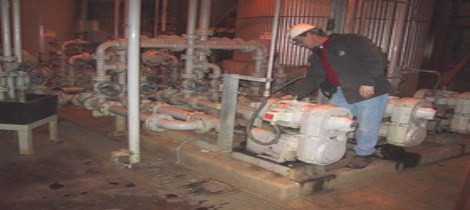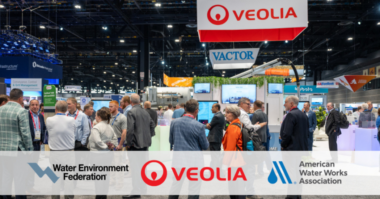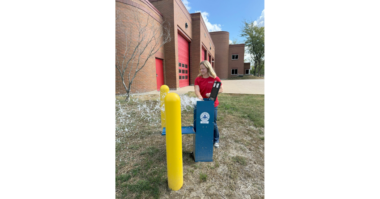For twelve years, progressive cavity (pc) pumps have prevented potential problems for a state-of-the-art, turnkey advanced flue gas desulphurization (AFGD) facility in northern Indiana, reliably moving highly abrasive gypsum slurry and filtrate sludge.
NIPSCO (Northern Indiana Public Service Company), headquartered in Merrillville IN, services 700,000 natural gas customers and 430,000 electricity customers across northern Indiana.
In 1993, NIPSCO asked Pure Air Products, a company specializing in AFGD systems, to lend their expertise in helping them manage sulphur gas (SOx) boiler emissions at their Bailly Station plant in Chesterton IN. Bailly Station, a high-sulphur, coal-fired power plant that serves northeast Indiana, wanted to not only meet, but exceed, new and tougher S0x emissions standards enacted in Clean Air Act Amendment of 1990. On their wish list, in addition to clean emissions, was minimum initial investment, economical operation, no disruption to power production for the large population they serve, low life-cycle costs, and finally, profitability. Furthermore, they wanted Pure Air to assume total system responsibility.
U.S. energy suppliers are once again favoring fossil fuels to produce abundant, efficient, and affordable energy. This is due in part to public disenchantment from perceived negative environmental risks of hydro- and nuclear energy, once thought to be ideal power sources. Even coal, the cheapest fossil fuel, is accepted as advanced technology develops effective ways to control the emissions (sulphur SOx and nitrogen NOx) that react with water, oxygen and other chemicals in the atmosphere, creating acid rain.
Pure Air was well known for having perfected the existing flue gas desulphurization (FGD) technology whereby harmful sulphur-based gases (SOx) are captured as they emerge from coal powered plant boilers. Following the removal of fly ash, the gases are wet-scrubbed–mixed with and absorbed by limestone (CaCO3) slurry. The SOx combined with the CaCO3 produces gypsum (CaSO4) slurry.
Moreover, Pure Air had refined the FGD process (to AFGD) by:
- transforming the resulting slurry into a marketable commodity, gypsum, which wall board manufacturers purchase directly from the plant, and
- processing leftover waste products, both liquid and solid, so only minimal cake remains for landfill.
NIPSCO therefore invited Pure Air to build a facility on-site which would manage the entire AFGD process from start to finish. During plant design, however, Richard Reinke, Pure Air’s Maintenance Manager at NIPSCO Bailly Station, alerted the design engineers to two potential fluids handling problems:
- transferring the gypsum slurry to the dewatering/centrifuge tanks, when the density could often be too high for their centrifugal pumps to handle, and
- transferring the filtrate that settles out from centrifuge water leftover from dewatering the gypsum. This filtrate sludge is moved to the waste treatment facility, to be turned into cake.
Both the gypsum slurry and the filtrate sludge are highly abrasive, with unpredictable densities. Furthermore, the pumps would need to operate reliably for 24 hours a day, 7 days a week, when required. “Without hesitation,” reports Reinke, “the design engineers recommended seepex progressive cavity pumps.”
In operation, a progressive cavity pump’s single helix rotor rotates within an elastomeric double helix stator to form sealed cavities that progress from the suction to the discharge end of the pump. The continuous seal between the rotor and the stator helices moves the fluid steadily, without valves or pulsations, at a fixed flow rate proportional to the rotational speed of the pump. Additionally, because seepex pump connections are external and flanged (as opposed to being threaded internally), bodies can be coated with materials resistant to abrasion and erosion. Their flow rate is also independent of pressure fluctuations from varying densities and viscosities, a crucial factor especially in the case of slurry entering a centrifuge.
To handle the gypsum slurry, with densities up to 40%, and high chloride levels (25,000 ppm), seepex recommended two 70-6L BN close-coupled pc pumps (next page). The pumps are equipped with molded-to-size EPDM stators, Duktil®-coated (Vickers hardness >1350) duplex (DIN 1.4462) stainless steel wetted rotating parts, and rubber-coated bodies, all of which can handle the highly corrosive and abrasive slurry. The stators are equipped with re-tensioning device that allows them to be adjusted as needed to maintain the desired compression between rotor and stator, thereby prolonging stator life. The 6-L geometry rotors and stators allow for greater volumetric and mechanical efficiency.
Pure Air’s gypsum slurry pumps with stator retensioning device
Reports Reinke: “Our seepex pumps take over when the slurry becomes too dense for our centrifugal pumps to handle. They operate trouble-free even with fluctuating solids percentages.” In eleven years of operation, the two 70-6L BN pumps have required only one replacement part, he adds.
Pumps to handle the filtrate sludge would be required to run continuously, 24 hours a day, 7 days a week. For this uninterrupted operation, seepex recommended three (3) 17-6L NS and three (3) 26-6L NS bare shaft progressive cavity pumps (below). These six pumps are equipped with molded-to-size Viton stators, Duktil®-coated duplex stainless steel wetted rotating parts, and rubber-lined bodies, all of which can handle the high-solids (up to 20%) and high-chloride content (30,000 ppm chlorides) filtrate sludge. The pumps are also designed with 6-L geometry, resulting in reduced thrust loads on the drive train. Reinke notes that these pumps have operated around the clock for 12 years with virtually no maintenance required.
Filtrate pumps must operate 24 hours per day, 7 days a week
Since the Pure Air facility at NIPSCO opened in 1992, they have surpassed expectations for clean emissions with 95%+ SOx removal. They have exceeded Clean Air Act requirements, two years ahead of the 1995 deadline, reducing SOx emissions by ca. 50,000 tons per year. They have virtually eliminated leftover solid and liquid wastes. Further, only a minimal crew is required to monitor operations to assure proper chemical balance of emissions. Pure Air produces tons of gypsum per year for NIPSCO, who then sells it to a nearby customer for wallboard production. In fact, demand for this gypsum is so great that, to date, customer orders exceed supply.
These achievements prompted the U.S. Department of Energy (DOE) to select the Pure Air On-Site AFGD project at NIPSCO Bailly Station as one of its model programs. NIPSCO also received Power Magazine’s 1993 Power Plant Award for becoming the first commercial scrubber in the U.S. to meet the new emissions standards, under budget and ahead of schedule, and for development of the groundbreaking AFGD technology.
Thanks to Pure Air’s contribution to NIPSCO’s profitable, reliable, and environmentally responsible operation, they are often called upon to serve in an advisory role to other plants whose management wants to institute similar successful programs.
For more information, log on to seepex.com.




